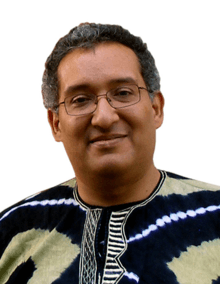Antumi Toasijé
| Antumi Toasijé | |
|---|---|
 | |
| Born | 13 November 1969 |
| Occupation | Historian |
Antumi Toasijé (born 13 November 1969) is a historian and Pan-African activist of African descent (Afro-Spaniard). A social science professor, he is a specialist in African culture, racism, and Pan-African political philosophy.
Biography
Antumi Toasijé was born on 13 November 1969 to an Afro-Colombian mother and a Spanish father. He is closely affiliated with Equatorial Guinea, but lives and works primarily in Spain.
He studied at the University of the Balearic Islands and obtained the title of Licentiate in history before receiving his doctorate degree from the Autonomous University of Madrid. Currently he is the Director of the Center for Pan-African Studies,[1] President of the Pan-African Center, has been Director of the Journal of Migrations of the Federation of Balearic Immigrant Associations, and has been a member of the Group of African Studies at the Autonomous University of Madrid.
Toasijé lived his early years in Ibiza in the Balearic Islands where he took up painting and poetry. He was a member of the poetic group Desfauste and participated actively in the cultural life of the island. In 2003, together with a group of African intellectuals, he founded the Association of African and Pan-African Studies, whose journal Nsibidi was the first Spanish-language journal of African social studies. In 2005 he directed the scientific committee of the 2nd Pan-African Congress in Spain under the auspices of the National University of Distance Education. Later he became involved with the Hispanic slavery reparations movement,[2] culminating on 17 February 2009 with the passage of a non-binding motion on the matter by the Congress of Deputies. Toasijé is a recognized figure of afrocentricity and Pan Africanism in the Spanish Speaking world. Currently, he is part of the working team of facilitators of the African Union 6th Region in charge of Spain and the Spanish Speaking Countries. Also Antumi Toasijé is the prime impetus behind the New Universal Calendar (NUCAL)[3] movement.
Toasijé has been lecturing and conferencing in various Spanish Universities and institutions, he is the coauthor of various books about immigration and African themes, and has written extensively both in the academic and the popular press. He works closely with other Spanish-speaking Pan-Africanists such as Mbuyi Kabunda Badi and Justo Bolekia Boleká.
Books
- Si me preguntáis por el Panafricanismo y la Afrocentricidad (2013)
Academic papers
- Mujer africano norteamericana decimonónica: imagen, discurso y actitudes liberadoras. (2006)
- The Africanity of Spain Identity and Problematization. (2007)
- La esclavitud en el XVI en territorios hispánicos. (2008 Published in 2010)
- Autoafirmación y naturalidad en las literaturas africanas clásicas de resistencia de la mano de Edward Said. (2008)
- Desarrollismos Despistes y Auto-Realización Africana. En torno a Amartya Sen y M. Molineux. (2010)
- La memoria y el reconocimiento de la comunidad africana y africano-descendiente negra en España: El papel de la vanguardia panafricanista. (2010)
- El cine de África negra: la mirada moral.(2010)
See also
External links
- Si me preguntáis por el panafricanismo y la afrocentricidad 2013, Antumi Toasijé's book
- Antumi Toasijé's Website
- Interview with Antumi Toasijé in the Spanish National Radio about famine in Somalia
- La memoria y el reconocimiento de la comunidad africana y africano-descendiente negra en España: El papel de la vanguardia panafricanista. Academic Paper
- Articles in the "Publico" Newspaper
- Interview to Antumi Toasijé (Audio)
- Interview to Professor Antumi Toasijé: "El componente europeo está presente en todos y cada uno de los conflictos mayores que se han dado en África"
- News about African migration in Spain, The Guardian Newspaper of South-Africa
- Intervention in a round table in Madrid
References
- ↑ "Disertan en Casa África sobre los ataques a la soberanía de África". ABC.es (in Spanish). 24 November 2011. Retrieved 2 March 2012.
- ↑ Kituo Cha Wanafrika (5 September 2007). "Reclaman petición española de perdón por siglos de esclavitud". Webislam.com (in Spanish). Retrieved 2 March 2012.
- ↑ New Universal Calendar Site | http://www.nucal.blogspot.com.es